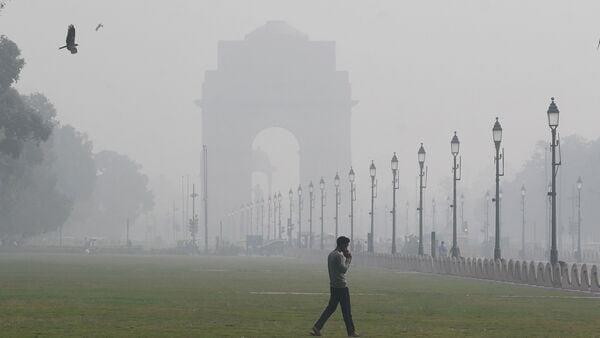
Delhi AQI Today: Air Quality Remains 'Very Poor', Hospitals See Surge In Respiratory Cases
According to the Sameer app, which provides hourly updates on the national AQI published by the CPCB, the AQI readings at Bawana and New Moti Bagh stations were in the 'severe' category, with values of 405 and 408, respectively.
Here are the AQI readings for other stations:
Lodhi: 319 (Very Poor)
Mandir Marg: 337 (Very Poor)
NSIT: 348 (Very Poor)
Narela: 356 (Very Poor)
New Moti Bagh: 394 (Severe)
Okhla Phase 2: 349 (Very Poor)
Punjabi Bagh: 352 (Very Poor)
Pusa Road: 329 (Very Poor)
Shadipur: 342 (Very Poor)
Siri Fort: 343 (Very Poor)
Vivek Vihar: 344 (Very Poor)
Alipur: 346 (Very Poor)
DTU: 311 (Very Poor)
Dwarka Sector 8: 326 (Very Poor)
Tito: 328 (Very Poor)
Jawaharlal Nehru Stadium: 319 (Very Poor)
Major Dhyan Chand Stadium: 357 (Very Poor)
The AQI categories are as follows:
0-50: Good
51-100: Satisfactory
101-200: Moderate
201-300: Poor
301-400: Very Poor
On Saturday, Delhi recorded a maximum temperature of 32.5°C, which is three degrees above the normal for this time of year. The minimum temperature was 18.3°C, four degrees higher than the season's average.
Humidity levels fluctuated between 78% and 98%, according to the India Meteorological Department (IMD).
The weather forecast for Sunday predicts moderate fog, with the maximum temperature expected to reach around 32°C and the minimum around 18°C.
Also Read: Delhi air pollution: Rise in asthma patients, double penalty on stubble burning as AQI drops to 'severe', know details
Meanwhile, Dr Nikhil Modi, Senior Consultant for Respiratory Critical Care at Apollo Hospital, said that apart from the regular patients, those who don't have any respiratory issues in the past are showing up with symptoms such as runny nose, sneezing, coughing and have increasing difficulties in breathing.
“We have seen the air quality index (AQI). It is more than 400 and even 500 in many places. Due to this, our regular patients, who have asthma and COPD (Chronic Obstructive Pulmonary Disease) are having exacerbations. They are having more breathing difficulty. They land up in emergencies to take nebulizers, and some of them require admission. Apart from the regular patients, what we are seeing are those who don't have any respiratory issues in the past, they are coming to us with runny noses, sneezing, and coughs, and they are also having increasing difficulties. So the number of cases has suddenly gone up,” Dr Modi told ANI.
The Apollo doctor further suggested that the government close the schools for children as they remain vulnerable. Whenever the pollution levels have gone beyond a certain limit, the government has opted to close the schools, Dr Modi said.
Also Read: Delhi, NCR AQI Highlights: Delhi's PM2.5 levels up by 13% on Diwali night in 2024, says repor
"For the last few years, we have been seeing that the government has taken action. Whenever this pollution level has gone beyond a certain limit, they have opted to close the schools. This is important because children are from a vulnerable group. As an adult, we are masked and can protect ourselves better, but children usually are not that effectively taking these measures. Secondly, their lungs are still in developing stages, so they are bound to have more harm due to this pollution," the doctor said.
(With inputs from ANI) Legal Disclaimer:
MENAFN provides the
information “as is” without warranty of any kind. We do not accept
any responsibility or liability for the accuracy, content, images,
videos, licenses, completeness, legality, or reliability of the information
contained in this article. If you have any complaints or copyright
issues related to this article, kindly contact the provider above.
















Comments
No comment